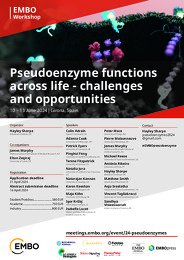About the Workshop
A significant number (~10%) of enzymes are pseudoenzymes, defined by deviations in catalytically-important residues. Despite the lack of catalytic activity, pseudoenzymes impact almost all cell biological processes across life. The best-studied pseudoenzymes are pseudokinases, although examples from other enzyme families, such as pseudophosphatases, pseudoproteases, pseudo-E2 ubiquitin ligases, pseudo-deubiquitinases and pseudo-GTPases, are emerging at a fast rate.
Several principles by which pseudoenzymes function are emerging, including as scaffolds, substrate competitors or allosteric modulators of their catalytic counterparts. Understanding these functions is likely to also enhance our knowledge of signalling principles by active enzymes, that often also display moonlighting functions. Despite being a nascent field, Pseudoenzymes are emerging as unexpected therapeutic targets.
The overarching aim of this EMBO Workshop is to bring together scientists working on diverse pseudoenzymes across phyla, therefore we have themed sessions around biological processes to capture the breadth of pseudoenzymes that are under investigation and the species in which pseudoenzymes play crucial roles. The workshop will start with a session on “challenges” – how do we computationally identify enzymes and pseudoenzymes to generate a discussion on whether we have even identified them all. Given the advent of new genomic data mining tools, including machine learning algorithms and tools like AlphaFold2, we suspect that a large number of pseudoenzymes are yet to be discovered and their roles are still unidentified. We will end the workshop on “opportunities”, with a focus on the therapeutic potential of pseudoenzymes.
Image credits: Elton Zeqiraj and Phospho Biomedical Animation (https://www.phospho.co.uk/)
About EMBO Courses and Workshops
EMBO Courses and Workshops are selected for their excellent scientific quality and timelines, provision of good networking activities for all participants and speaker gender diversity (at least 40% of speakers must be from the underrepresented gender).
Organisers are encouraged to implement measures to make the meeting environmentally more sustainable.















